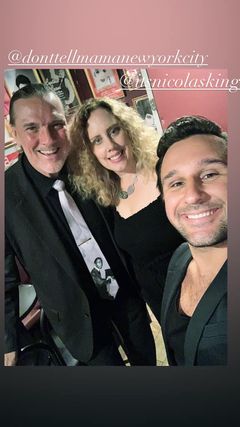
At long last, a LIVE, in-person American Popular Song Society event! Celebrating the late Susannah McCorkle, gone now 20 years.
Excellent production by Jerry Osterberg, with performances by Danny Bacher, Gabrielle Stravelli, Mark Nadler, Aisha de Haas and Lucy Wijnands, with Susannah’s pianist and musical director Allen Farnham providing the accompaniment for all but Mark.
This was meant to be a livestreamed and videotaped performance, in addition to the live audience at Don’t Tell Mama for the monthly event. Unfortunately, due to technical difficulties, there’s no video and no photos available. So you had to be there.
Here’s my write-up:
I only encountered Susannah McCorkle once, well before I even knew about the cabaret scene, at an event at the 42nd Street Automat produced by WNEW-1130 radio sometime in the early 1980s. Jonathan Schwartz played her regularly. Her rendition at the event was the first time I’d ever heard anyone sing “Spring Will Be a Little Late This Year.”
It was quite a coup for Jerry Osterberg to get Allen Farnham, who is currently in the pit for The Lion King on Broadway, as the musical director and accompanist today. He had to leave early for that show.
Danny Bacher is a funny and talented singer and master of the soprano sax (or as Jerry called it, a flute). Danny likes to throw in funny little asides in the songs. He started the verse to Harold Arlen and Johnny Mercer’s “Accentuate the Positive”, singing “Gather ‘round me, everybody…. But not too close.” On “You Go To My Head,” with a bossa beat, he sang, “So I say to myself…. Self?” He brought up Lucy Wijnand for a duet on Johnny Mercer’s “At the Jazz Band Ball,” then finished with Antonio Carlos Jobim’s “How Insensitive,” with Lucy on vocal. Lucy is a fresh-faced young woman whose voice is reminiscent of Sarah Vaughn when she uses her lower register. I learned later that, to no surprise, Vaughn is a big influence on Lucy. A lovely “I’ll Take Romance” (Ben Oakland/Oscar Hammerstein II) had a light swinging rhythm with a bridge played as a waltz. Lucy introduced Rodgers & Hart’s humorous “I Wish I Were In Love Again” with the rarely sung verse, and finished big.
Gabrielle Stravelli is always a delight. She sings with a twinkle in her eyes, radiating joy as she masterfully sings and swings. Gabrielle sang the verse to Gershwin’s “They All Laughed,” which I’d never heard before, then taking us on a fun adventure with her versatile voice.
Gabrielle shared that the first jazz standard she’d ever been introduced to was “Skylark” (Hoagy Carmichael/Johnny Mercer), and sang the ballad beautifully. She ended her set with the funny Dave Frishberg song “My Attorney Bernie.”
Broadway and jazz artist Aisha de Haas was another great get by Jerry. She sang a sultry “Lover Man” (Jimmy Davis/Roger Ramirez/James Sherman). She sang a song she first learned from the record her aunt (Geraldine Bey) made with her group, the Bey Sisters, “Every Time We Say Goodbye” (Cole Porter), with the verse. The line “How great the change from major to minor,” one of my favorite phrases from any song, felt especially poignant in her hands.
Aisha finished her set with the jazziest song of the show, Cole Porter’s “You’d Be So Nice to Come Home To.”
Danny and Lucy returned for a great old-school duet on “Thanks For The Memory” (Ralph Rainger/Leo Robin), after which Farnham had to dash off to The Lion King.
The final artist was Mark Nadler, who shared with us that Susannah was one of his closest friends. He became visibly choked up speaking about her. He made it clear how fun she was to be with, and that in their first encounter, Susannah, then writing an article about Irving Berlin for American Heritage, found Mark at a show and asked him, “Why is Irving Berlin indispensable to you?”
Mark is a great showman with considerable ability. For Irving Berlin’s “Isn’t This A Lovely Day,” he made the piano sound like it was raining while singing “Let the rain pitter-patter.” He brought back Gabrielle Stravelli for an adorable duet of “Two Sleepy People,” infusing great humor through their bon mots, phrasing and body language, turning the lovely couple of the song into what might be described as “two creepy people” who smile at one another through clenched teeth.
Mark played Billy Strayhorn’s “Something to Live For,” which had erroneously been credited to Ervin Drake in the program. “How thrilled would Edith have been to know she was married to a short, black, gay man?”
For the final number of the program, Mark recreated Susannah McCorkle’s arrangement of “There’s No Business Like Show Business” (Irving Berlin). Normally a fast, happy tune that glamorizes even the hard parts of show business, here it is a tour de force of tragedy and irony, pathos and tears, with the song becoming a metaphor for surviving failure. From its rubato opening to the big finish that let us know it’s going to be okay, and let’s go on with the show, Mark’s stunning, dramatic interpretation of Susannah’s arrangement was simply spectacular.
Bravo, brava, bravissimo, bravissima…. Fini!

The American Popular Song Society
Skylark: Remembering Susannah
Don’t Tell Mama
343 West 46th Street, NYC




